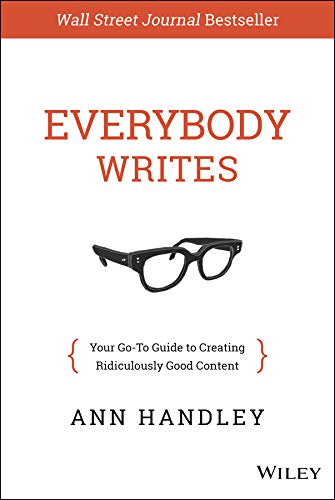This post is part of the 📖 Everybody Writes series.
Today I am reading Chapter 32 of the book Everybody Writes written by Author Ann Handley.
Chapter 32
Know the difference between Active and passive voice
Using the passive voice is not incorrect, but you’ll vastly improve your writing just by making your sentences active.
Passive: The video was edited by a guy named Hibachi.
Active: A guy named Hibachi edited the video.
Passive: Duduk theme music is rarely featured on podcasts.
Active: Podcasts rarely feature duduk theme music.Chapter 33
Ditch Weakling Verbs
Use expressive verbs as they paint vivid pictures in the reader’s mind.
Instead of:
In his anger, he accidentally cut his finger.
Try:
In his anger, he accidentally slashed his finger.
Chapter 34
Ditch Adverbs, Except When They Adjust the Meaning
Use adverbs gratuitously. They add bloat to the field.
The road to hell is paved with adverbs.
Adverbs, like the passive voice, seem to have been created with the timid writer in mind. With adverbs, the writer usually tells us he or she is afraid he/ she isn’t expressing himself/ herself clearly, that he or she is not getting the point or the picture across.
Instead of:
He closed the door firmly.
Use:
He slammed the door.
Chapter 35
Use Cliches Only Once in a Blue Moon
A cliché is an overused simile or metaphor, an unoriginal thought.
They don’t add a lot to a discussion. You’ve probably heard most of them, and they are terrible:
- Open the kimono
- Move the needle
- A ready, fire, aim approach
- Take a 30,000-foot view
- Open-door policy
- At the end of the day
- All things being equal
- Drink from the fire hose
- Peel back the onion
- Where the rubber meets the road
When you use them sparingly—more as a seasoning than the main course.

Do you know you can listen to this book on Amazon Audible for FREE?
If you are not into reading like me, then you can listen to this book for FREE on Amazon Audible
Don't Read. Just 🎧Key Takeaways
Use active voice in your copy.
With strong verbs, your sentences come alive; they throb with a pulse. But don’t overdo it.
Use adverbs sparingly. (
sparinglybeing an adverb but it’s ok to use here I believe 😉).How is this?
Use adverbs infrequent manner 🤪
Nah. I will keep adverb there.
Often you can ditch an adverb if you also ditch a weakling verb in favour of livelier one.
For example, instead of saying production increased
quickly, you might opt for productionsurged.Never use a metaphor, simile, or another figure of speech which you are used to seeing in print.
Summary
Use active instead of passive voice. Try to avoid adverbs, especially if they are not adding any value. Replace the modifier with a strong verb. Avoid cliches.
If you read and understand the excellent practical and easy implementable material in this book, it will surely transform your writing and business alike.
What are you waiting? Go and buy and transform your writing for good forever.
Author(s): Ann Handley
Part 16 of 35 in the 📖 Everybody Writes book series.
Series Start | Everybody Writes - Day 15 | Everybody Writes - Day 17
